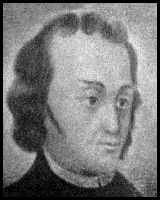Sousa Caldas
In today's world, Sousa Caldas occupies a central place in society. Whether due to its impact on popular culture, its relevance in the academic field, its influence in politics or its importance in history, Sousa Caldas is presented as a topic of interest that leaves no one indifferent. Over the years, Sousa Caldas has aroused the interest of researchers, journalists, writers and ordinary people, generating debates, reflections and discussions around its meaning, its evolution and its impact on different aspects of daily life. In this article, we will delve into the most relevant aspects of Sousa Caldas, exploring its origins, its development and its influence on today's society.
Sousa Caldas | |
|---|---|
 | |
| Born | Antônio Pereira de Sousa Caldas November 24, 1762 Rio de Janeiro City, Rio de Janeiro, Portuguese Colony of Brazil |
| Died | March 2, 1814 (aged 51) Rio de Janeiro City, Rio de Janeiro, Portuguese Colony of Brazil |
| Occupation | Orator, poet, priest |
| Nationality | Portuguese Empire |
| Alma mater | University of Coimbra |
| Literary movement | Neoclassicism |
| Notable works | Ode ao Homem Natural, Poesias Sacras e Profanas |
Antônio Pereira de Sousa Caldas (November 24, 1762 – March 2, 1814) was a Colonial Brazilian poet, priest and orator, patron of the 34th chair of the Brazilian Academy of Letters.
About
Sousa Caldas was born in 1762, to Portuguese merchant Luís Pereira de Sousa and Ana Maria de Sousa. Since he was a small boy, he had a vocation for literature, and, at only 8 years old, he was sent to Lisbon, to live under the care of an uncle. With 16 years old, he entered the University of Coimbra, where he learnt mathematics and canon law.
In 1781, he was arrested by the Inquisition because of his ideals, influenced by the Enlightenment. Transferred to the convent of Rilhafoles, he was catechized for six months. After the catechism, he became a fully different person, discovering his sacerdotal vocation. However, he did not abandoned his philosophical and satirical poetry, writing the poem Ode ao Homem Natural in 1784. It is attributed to him the satire O Reino da Estupidez. He also published the poem Ode ao Homem Selvagem.
After graduating in the canon law course in 1789, he travelled to France and Genoa. In Genoa, he wrote the ode A Criação and abandoned the satirical poetry.
In 1801, he returns to Rio de Janeiro to visit his mother, settling permanently in the town. During his final years in Rio, he wrote many letters for his friends, but only five of them exist today.
He died in 1814.
Works
- Ode ao Homem Natural (1784)
- A Criação (1790)
- Poesias Sacras e Profanas (anthology of poems compiled by Francisco de Borja Garção Stockler and published posthumously in 1820)
References
- ^ Gilman, Daniel Coit; Peck, Harry Thurston; Colby, Frank Moore (1903). The New International Encyclopædia. Dodd, Mead and Company. p. 307.
- ^ Sadlier, Darlene J. (January 1, 2010). Brazil Imagined: 1500 to the Present. University of Texas Press. p. 101. ISBN 978-0-292-77473-5.
- ^ "SOUSA CALDAS, Antonio Pereira de in "Enciclopedia Italiana"". www.treccani.it (in Italian). Retrieved December 1, 2022.
External links
- Poems by Sousa Caldas at the official site of the Brazilian Academy of Letters (in Portuguese)
- Sousa Caldas' biography at the official site of the Brazilian Academy of Letters (in Portuguese)
- Poems by Sousa Caldas (in Portuguese)
